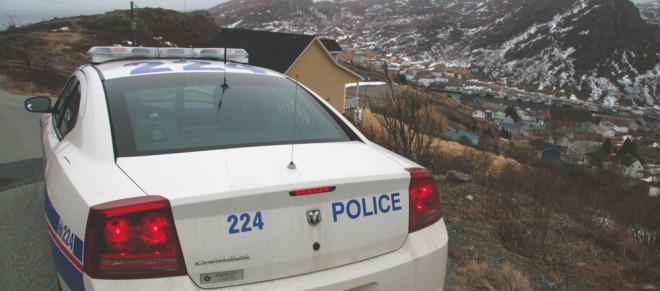Canada’s most dangerous cities: Newfoundland’s other boom
The prosperity and good jobs lifting the province’s fortunes have also attracted more criminals
AA62WP Royal Newfoundland Constabulary patrol car
Share

 One would love to have been a fly on the wall in November 2009, when 21-year-old Bradley Kavanagh landed at Vancouver airport after a cross-country flight from St. John’s, Nfld. He’d left the island province with $195,000 cash in vacuum-sealed bags in his checked-in luggage. When he landed in B.C., the airline said the luggage was lost, which just had to ruin his day. The money, quietly seized by the Royal Newfoundland Constabulary (RNC) before it left St. John’s, was part of a major drug and money laundering ring operating in Newfoundland, but largely run by criminals from Victoria.
One would love to have been a fly on the wall in November 2009, when 21-year-old Bradley Kavanagh landed at Vancouver airport after a cross-country flight from St. John’s, Nfld. He’d left the island province with $195,000 cash in vacuum-sealed bags in his checked-in luggage. When he landed in B.C., the airline said the luggage was lost, which just had to ruin his day. The money, quietly seized by the Royal Newfoundland Constabulary (RNC) before it left St. John’s, was part of a major drug and money laundering ring operating in Newfoundland, but largely run by criminals from Victoria.
The boom in offshore oil and construction is drawing Newfoundlanders and come-from-aways to the provincial capital, but the prosperity is also a magnet for criminals. “When you have economic growth you attract legitimate business and you also attract illegal business,” says RNC Chief Robert Johnston. “Supply and demand.”
While Canada’s Crime Severity Index score has fallen 22.5 per cent in the decade from 2000 to 2010, Newfoundland, and especially its capital, are heading in the wrong direction. The overall crime score increased 14 per cent for the province and almost 17 per cent for St. John’s. The city’s violent crime score jumped 41 per cent since 2000. Ten years back, St. John’s overall crime score ranked an idyllic 65th lowest among 100 cities. Now it’s climbed to 25th.
The crime increase is partly due to a population shift. Prosperity draws expats home from the Alberta oil sands and elsewhere, sometimes bringing drug issues with them. And people are leaving rural Newfoundland for the capital to find jobs, health services for an aging demographic, and mental health and outreach programs. “Unfortunately, some of those people are vulnerable, and there is an increase in crime,” Johnston says.
The RNC has responded in kind. It added 85 new police officers and 29 civilians in recent years. It expanded its dog, drug, surveillance and intelligence units. That increased capability played a key role in shutting down two multi-million-dollar drug rings. In 2007, police dismantled a Quebec-run drug operation with ties to the Hells Angels. In early 2010, the RNC, aided by police on both coasts, swooped in on the Victoria-run ring that had moved in to fill the void. Fourteen people were charged, and almost $1 million in drugs and $500,000 in cash was seized.
Much of the police response hasn’t been so dramatic. It’s about preventing crime by building relationships in the community, says Johnston. “It’s a collaborative approach. Policing alone is not going to fix crime.”